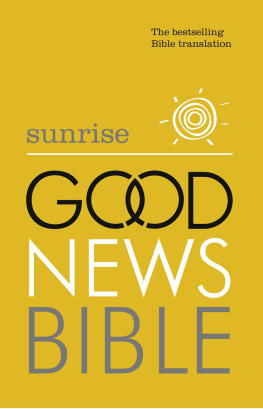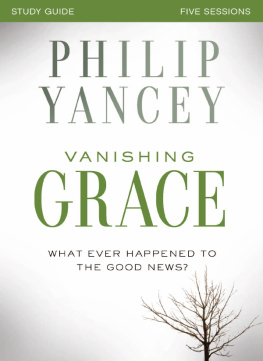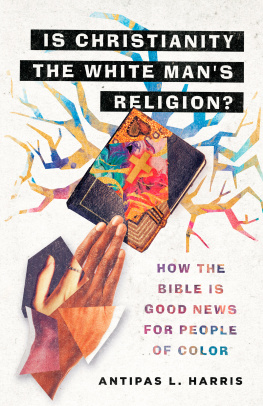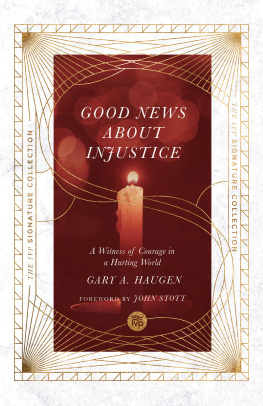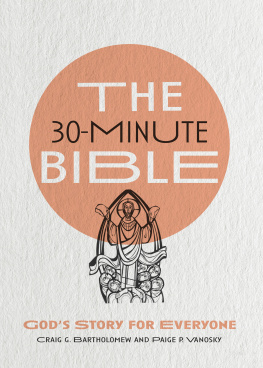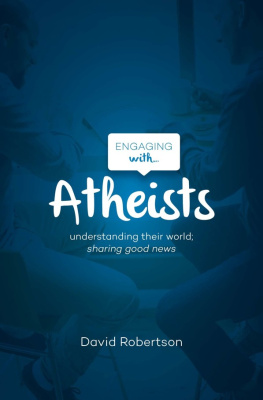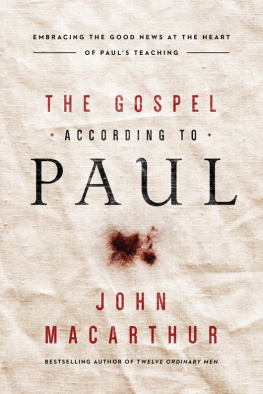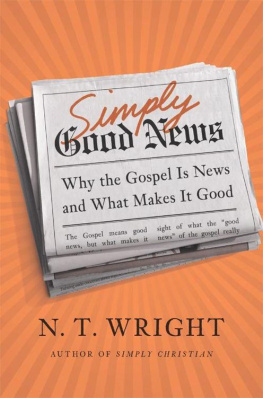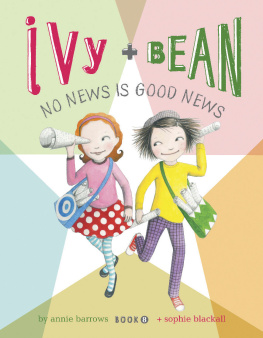Good News Bible
Here you can read online Good News Bible full text of the book (entire story) in english for free. Download pdf and epub, get meaning, cover and reviews about this ebook. year: 2014, publisher: HarperCollins Publishers, genre: Religion. Description of the work, (preface) as well as reviews are available. Best literature library LitArk.com created for fans of good reading and offers a wide selection of genres:
Romance novel
Science fiction
Adventure
Detective
Science
History
Home and family
Prose
Art
Politics
Computer
Non-fiction
Religion
Business
Children
Humor
Choose a favorite category and find really read worthwhile books. Enjoy immersion in the world of imagination, feel the emotions of the characters or learn something new for yourself, make an fascinating discovery.
Good News Bible: summary, description and annotation
We offer to read an annotation, description, summary or preface (depends on what the author of the book "Good News Bible" wrote himself). If you haven't found the necessary information about the book — write in the comments, we will try to find it.
Unknown: author's other books
Who wrote Good News Bible? Find out the surname, the name of the author of the book and a list of all author's works by series.
Good News Bible — read online for free the complete book (whole text) full work
Below is the text of the book, divided by pages. System saving the place of the last page read, allows you to conveniently read the book "Good News Bible" online for free, without having to search again every time where you left off. Put a bookmark, and you can go to the page where you finished reading at any time.
Font size:
Interval:
Bookmark:

| Acts | NT |
| Amos | OT |
| 1 Chr | OT |
| 2 Chr | OT |
| Col | NT |
| 1 Cor | NT |
| 2 Cor | NT |
| Dan | OT |
| Deut | OT |
| Ecc | OT |
| Eph | NT |
| Esth | OT |
| Ex | OT |
| Ezek | OT |
| Ezra | OT |
| Gal | NT |
| Gen | OT |
| Hab | OT |
| Hag | OT |
| Heb | NT |
| Hos | OT |
| Is | OT |
| Jas | NT |
| Jer | OT |
| Job | OT |
| Joel | OT |
| Jn | NT |
| 1 Jn | NT |
| 2 Jn | NT |
| 3 Jn | NT |
| Jon | OT |
| Josh | OT |
| Jude | NT |
| Judg | OT |
| 1 Kgs | OT |
| 2 Kgs | OT |
| Lam | OT |
| Lev | OT |
| Lk | NT |
| Mal | OT |
| Mk | NT |
| Mt | NT |
| Mic | OT |
| Nah | OT |
| Neh | OT |
| Num | OT |
| Obad | OT |
| 1 Pet | NT |
| 2 Pet | NT |
| Phlm | NT |
| Phil | NT |
| Prov | OT |
| Ps | OT |
| Rev | NT |
| Rom | NT |
| Ruth | OT |
| 1 Sam | OT |
| 2 Sam | OT |
| Song | OT |
| 1 Thes | NT |
| 2 Thes | NT |
| 1 Tim | NT |
| 2 Tim | NT |
| Tit | NT |
| Zech | OT |
| Zeph | OT |
Other Abbreviations
| Circa (around) | c |
| Old Testament | OT |
| New Testament | NT |
| Septuagint | LXX |
The Good News Bible is an easy-to-read translation of the Bible. It uses clear, readable, everyday English, which is why, over the years, thousands of churches and schools and millions of individuals have chosen the Good News Bible.
The Bible is an anthology
The Bible is not one book, but a collection of books bound into one volume. (In fact, thats where it gets its name from. The Bible is the English-language version of the Greek words ta biblia, which means the books.) Written over thousands of years, by many different authors, these books contain many different types of writing: poetry, history, laws, prophecy, proverbs and sayings, stories, letters and many more.
This Bible is in two parts
These books are arranged into two sections: the Old and New Testaments. Testament means promise. For Christians the Old Testament is the promise given by God to the Jews; the New Testament is the promise given through Jesus.
The Hebrew Scriptures or Old Testament (39 books)
The first part of the Bible contains the sacred writings of Judaism. This tells the story of the people of Israel. The Jewish name for this is the Tanakh : the name is based on the first letters of the three main sections: Torah (The Law), Neviim (The Prophets) and Ketuvim (The Writings). TNK = Tanakh.
Christians call this section the Old Testament, which is arranged as follows:
The Law The first five books tell the story of the creation of the world, Gods promises to people like Abraham and Jacob, the beginnings of the Israelite nation, their slavery in Egypt and their escape. It also contains the Law which the Jewish people were supposed to obey.
Historical books Twelve books covering the history of Israel, from the conquest of the Promised Land, to the defeat, exile and eventual return.
Poetic books Six extremely varied books reflecting all the moods of human life. They address many fundamental and difficult issues of human existence such as suffering, joy, love, anger, despair, delight and everything in between!
Prophets Sixteen books, the first four of which are the major prophets (which really means long books) while the remaining twelve are the minor prophets (theyre shorter). They cover the time from the later kings into the exile. But they also contain prophecies of the future, and many statements which Christians believe were fulfilled in Jesus.
The Christian Scriptures or New Testament (27 books)
This is the collection of Christian Scriptures. These writings fall into three main groups:
The Gospels and Acts The four Gospels are a biographical and historical look at the life of Jesus, while the book of Acts tells the story of the first thirty years of the Early Church.
Letters of Paul, John, Peter and others. These were circulated among the first followers of Jesus. They give guidance, encouragement and sometimes a strong rebuke to the first communities of Christians.
Prophecy This was probably sent as a letter, but, with its visionary, apocalyptic language, stands alone.
Finding your way around
To help readers find their way around, each book of the Bible is subdivided into chapters and verses. So when people talk about a Bible reference, they are talking about this system. John 3.16 is like an address: it means the book of John, chapter 3 and then verse 16.
The books of the Bible did not originally include chapters and verses. These were added a lot later. The chapter numbering system we use today dates from the 13th century AD , and the verse subdivisions date from the 16th century.
Take your time
Read slowly and carefully. The Bible wasnt built for speed reading. Try to read in chunks. One verse on its own might not make much sense, but when you read a bit more of the text around it, that can really help. You need to read enough of the passage to get an idea of what the overall story or argument is. Sometimes it really helps to read the passage out loud. And the Bible was meant to be heard this way. For most of its history it was more of an audiobook: because most people couldnt read or write, they had the passage read to them. And because its such an accessible translation, the Good News Bible is great for this!
Work to a plan
Q: How do you eat an elephant? A: One bite at a time.
The Bible is a seriously complex book. You cant expect to read the whole thing through at one sitting. Instead you have to break it down and read it in bite-sized chunks.
It helps to have a plan. Maybe you want to work through a book, chapter by chapter. Maybe, if the book is shorter you can read through the whole book. Or maybe you want to use a specific reading plan to help you explore what the Bible has to say on a particular topic, character or event. There are plenty of reading plans available to help you.
Always ask questions
One of the most important tools to help you read the Bible is your brain. Ask who, why, what, where, when? Who is saying this? Why is this happening? When is this story set? Who is this person? What does that mean? Sometimes it helps to make notes as you go along. You can draw pictures and diagrams if that helps.
Font size:
Interval:
Bookmark:
Similar books «Good News Bible»
Look at similar books to Good News Bible. We have selected literature similar in name and meaning in the hope of providing readers with more options to find new, interesting, not yet read works.
Discussion, reviews of the book Good News Bible and just readers' own opinions. Leave your comments, write what you think about the work, its meaning or the main characters. Specify what exactly you liked and what you didn't like, and why you think so.

